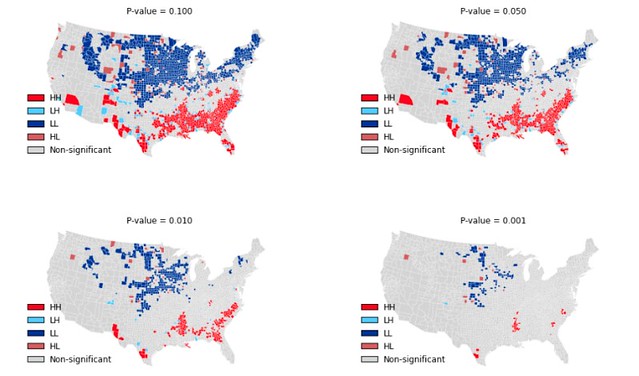PySAL is an open source cross-platform library of spatial analysis functions written in Python. It is intended to support the development of high level applications for spatial analysis.

Above: Local Indicators of Spatial Association for Homicide Rates in US Counties 1990.
It is important to underscore what PySAL is, and is not, designed to do. First and foremost, PySAL is a library in the fullest sense of the word. Developers looking for a suite of spatial analytical methods that they can incorporate into application development should feel at home using PySAL. Spatial analysts who may be carrying out research projects requiring customized scripting, extensive simulation analysis, or those seeking to advance the state of the art in spatial analysis should also find PySAL to be a useful foundation for their work.
End users looking for a user friendly graphical user interface for spatial analysis should not turn to PySAL directly. Instead, we would direct them to projects like the GeoDaX suite of software products which wrap PySAL functionality in GUIs. At the same time, we expect that with developments such as the Python based plug-in architectures for QGIS, GRASS, and the toolbox extensions for ArcGIS, that end user access to PySAL functionality will be widening in the near future.
- pysal.cg Computational geometry
- pysal.contrib Contributed modules
- pysal.core Core data structures and IO
- pysal.esda Exploratory spatial data analysis
- pysal.examples Data sets
- pysal.inequality Spatial inequality analysis
- pysal.network Spatial analysis on networks
- pysal.region Spatially constrained clustering
- pysal.spatial_dynamics Spatial dynamics
- pysal.spreg Spatial econometrics and diagnostics
- pysal.weights Spatial weights
PySAL can be installed using pip:
$ pip install pysalPySAL is also available through Anaconda and Enthought Canopy.
For help on using PySAL, check out the following resources:
PySAL development is hosted on github.
Discussions of development occurs on the developer list as well as gitter.
If you are interested in contributing to PySAL please see our development guidelines.
To search for or report bugs, please see PySAL's issues.
See the file "LICENSE.txt" for information on the history of this software, terms & conditions for usage, and a DISCLAIMER OF ALL WARRANTIES.